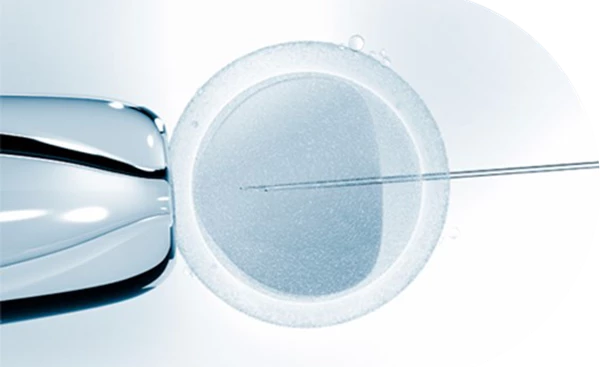Intracytoplasmic Sperm Injection (ICSI)
ICSI is a specialised laboratory technique that has revolutionised IVF treatment for male factor infertility

Around half of couples who are having problems conceiving have sperm-related issues and ICSI is the most common and successful treatment for male infertility.
What is ICSI?
The Intra-Cytoplasmic Sperm Injection is performed in the lab, after the egg collection and involves the injection of a single sperm into the fluid contents of the egg cell, called cytoplasm.
A glass pipette, which is finer than a human hair, is used to collect a single sperm and inject it into the egg. The fertilised embryo(s) is then transferred to the women’s womb. Other than this element in the lab, your experience of treatment is the same as that of patients undergoing IVF.
Who is it for?
This treatment is suitable for couples who have a male factor infertility problem such as:
- There are few sperm cells in the man's ejaculate
- The sperm cells have poor motility
- The sperm needs to be surgically collected for example the male has had a vasectomy
- Multiple IVF attempts have been made without pregnancy
How does ICSI work?
A normal sperm sample can contain several million sperm cells, but only one single sperm cell will be used to fertilise an egg. Normal sperm cells have good motility and are geared towards reaching the egg. If we examine a sperm sample and see that there are very few sperm or that the sperm do not move as normal, then this tells us that the chances of fertilisation are lower and we will therefore recommend ICSI – micro-insemination.
ICSI is performed in the laboratory once the eggs have been removed. The embryologist works using a special ICSI microscope in which both egg and sperm cells can be seen simultaneously.
The embryologist chooses the single sperm cell that looks most normal and moves as it should and injects it into an egg cell using a very thin glass pipette that is finer than a strand of hair. This method helps the sperm cells to fertilise the eggs.
The fertilised eggs, now known as embryos, are placed in an incubator and their development is carefully followed and monitored by the embryologists.

When is ICSI used?
We recommend ICSI when the sperm cells are in need of a little extra help to fertilise the egg.
Depending on your fertility history, we might discuss ICSI with you right from our very first meeting in the case we consider that it will increase your chances of pregnancy. Our assessment will be based on sperm samples and a consideration of what treatment types you have tried already.
On some occasions we might discuss ICSI with you on the day you come in for egg extraction. Our embryologists will evaluate the sperm by microscope on the same day that your eggs are extracted. If the embryologists believe that ICSI may increase your chances of fertilisation, then we will talk to you about this possibility.
We can also choose to use ICSI on half of the eggs and regular IVF on the other half. This is usually something we opt for after you have already undergone several IVF attempts without pregnancy. There is not always a good explanation as to why pregnancy does not occur following fertility treatment, and so using ICSI on some but not all of the eggs can therefore help us to identify what approach is best in order to optimise the chances of pregnancy in your specific case.
What are the benefits?
 Improved fertilisation
Improved fertilisation
Fertilisation is possible even with very low numbers of sperm. ICSI has a fertilisation rate of around 70%.
 Male factor infertility
Male factor infertility
ICSI is effective for several different types of sperm problems
 Widely used technique
Widely used technique
It is a widely used technique.
Our ICSI treatment starts at €595
If you require ICSI due to a male factor fertility issue this can be added to either a Natural/Natural Modified or Mild IVF cycle.
Being recommended ICSI will depend on your individual circumstances and your personalised treatment plan which will be explained to you in more detail at your Virtual Consultation.
If you wish to find out more please view our price guide or give us a call.

